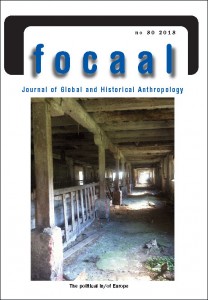As anthropologists, we strive to speak up for the often marginalized and underprivileged populations we study. Aiming to do so rigorously by heeding the structures that create and reproduce the injustices we witness, many of us have found our way to the critique of capitalism by Karl Marx and his followers. Moishe Postone introduced cohorts of anthropologists and others who were drawn to his cross-disciplinary courses at the University of Chicago to Marx and critical theory. While his writings have inspired scholars and activists worldwide and across the social sciences and humanities, Postone had also paved a path from Marxian theory to empirical critique that ethnographic fieldwork is well poised to accomplish.
All posts by Focaal Web Editor
Eeva Kesküla: How capitalists think about labor dynasties and corporate ethics
This post is part of a feature on “How Capitalists Think,” moderated and edited by Patrick Neveling (University of Bergen) and Tijo Salverda (University of Cologne).
This contribution looks at the implications of how capitalists think about corporate ethics and moral obligations in monoindustrial towns. I present the cases of two mining towns in Estonia and Kazakhstan that share the history of honoring labor dynasties. In both settings, during the Soviet period, labor dynasties had a special place in company histories and grandfather-father-son working together were celebrated through stories in newspapers, awards on miners’ professional holiday, and photos on the mine’s noticeboard. Ideologically, dynasties represented a “labor aristocracy” that was to replace the prerevolutionary hereditary aristocracy, and such workers were to serve as examples to others (Tkach 2003).
The Life of Viktor (An Easter Folktale from Central Europe)
Editorial note: This text was submitted by a colleague who wishes to remain anonymous; he has informed us that “this version of Viktor’s tale has been embellished in accordance with conventions of the genre (but also beyond them); at the same time, experts have ascertained that this version is not to be confused with the “fake news” that became so widespread in this era; all personal names and place names have been verified; they are real and authentic.”
Georg Materna: “Two tribes of capitalists”: Neoconomists and politiconomists in a Senegalese marketplace
This post is part of a feature on “How Capitalists Think,” moderated and edited by Patrick Neveling (University of Bergen) and Tijo Salverda (University of Cologne).
Research on capitalism commonly distinguishes between neoclassical economics and political economy. If neoclassical economics have dominated scientific debates since the 1930s at the latest, the nineteenth century view was that of political economy, with Karl Marx providing a powerful critique thereof. Both theories influence scientific reasoning until today. Yet, could both also elucidate the quotidian behavior of “normal” people in ethnographies of everyday life in the twenty-first century?
Patrick Neveling and Tijo Salverda: How capitalists think—about belonging, moralities, global entanglements, and historical social processes, for example
Given that nowadays most people live in societies organized according to capitalist principles and given that few oppose those principles fundamentally, capitalists may well constitute the world’s largest ideology-based formation. Most anthropologists have undoubtedly had encounters with capitalists, who occupy positions in all social strata. Yet, apart from the “usual suspects” such as CEOs, elites, leading politicians, and other members of the transnational capitalist class, our discipline pays little, and certainly not enough, explicit attention to the many who equally support and/or benefit from capitalist principles—be they ordinary employees in governments and in the private sector, subalterns with native title claims, or even social welfare claimants (for the varying scope and scale of anthropological research so far, see Friedman 1999; Kalb 1997; Neveling 2015; Rose 2015; Salverda 2015). Continue reading
Focaal Volume 2018, Issue 80: The political in/of Europe
We are pleased to announce that the latest issue of Focaal – Journal of Global and Historical Anthropology has recently published and is available online at its new home, www.berghahnjournals.com/focaal.
Marc Edelman: Sacrifice zones in rural and nonmetro USA: Fertile soil for authoritarian populism
Sacrifice zones—abandoned, economically shattered places, with growing social and health problems—are spreading in historically white rural areas and small towns across the United States. Rural decline, rooted in economic restructuring and financialization, exacerbates racial resentment and fosters regressive authoritarian politics.
David Graeber: Manufactured ignorance: The strange case of Juan Cole and the Kurdish Freedom Movement, and the International Liberal Intelligentsia
 This is a story about how a well-meaning liberal American professor can end up becoming an active propagandist for right-wing forces attempting to destroy a feminist revolution.
This is a story about how a well-meaning liberal American professor can end up becoming an active propagandist for right-wing forces attempting to destroy a feminist revolution.
Heike Becker: “Global 1968” on the African continent
Fifty years after student protests shook much of the Cold War world, in the “West” and in the “East,” “Global 1968” has become the catchphrase to describe these profound generational revolts. West Berlin, Paris, and Berkeley spring to mind prominently, and most memorable behind what was then the Iron Curtain were the events of the Prague Spring. For most commentators and scholars, these events in the Global North appear to have constituted “Global 1968.”
Quinn Slobodian: Against the neoliberalism taboo
Daniel Rodgers has written the latest would-be obituary for neoliberalism as a category of analysis, hot off the press in the first 2018 issue of Dissent magazine. Like Rajesh Venugopal and Bill Dunn before him, he creates a typology of the term’s use before concluding its analytical and political uselessness. Personally, I remain invested in seeking greater precision for the term rather than discarding it. The transformations, competing definitions, and contradictions of a term like liberalism or socialism have not led us to jettison those terms, so why this one?
